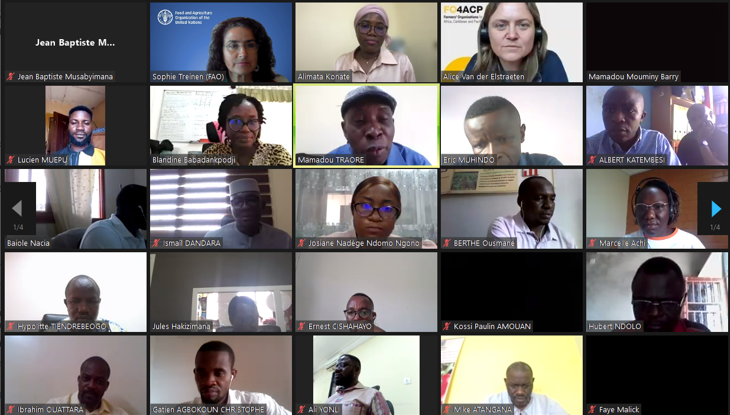The 4th webinar in the series on experience capitalization dealt with the second part of implementation of the experience capitalization process, more specifically the steps relating to documentation and sharing.
The main objective of a capitalization process is to share the lessons learned and the knowledge generated. These lessons can be presented in different formats (written, oral, audiovisual and/or digital, etc.), depending on the target audience and their specific objectives. Whatever the final choice, it is important to put the results of the capitalization process in writing. A written document can take various forms. To be effective, it must be concise, attractive and rigorous, while presenting the results of the analysis clearly and convincingly. Indeed, capitalizing is not just about documenting, but also about sharing the results of capitalisation through a variety of products, using different communication channels.
During the webinar, participants were able to recognise the importance of writing to document an experience capitalisation process. The facilitators gave some advice on how to improve writing skills, prepare the writing and structure the content.
The lessons learned and knowledge gained from experience capitalization are of interest and relevance to many people, including those who did not take part in the process. A communication strategy helps to determine how to reach these other groups of people. A communications strategy can be a simple document that clearly describes the audience to be reached, the messages to be sent and the products to deliver the messages. It also defines the channels to be used to reach the target audience effectively. The communications strategy must take into account the fact that different people want to hear different things about your experience. You need to be prepared to design different messages and products for each type of audience.
Certain knowledge-sharing methods, such as knowledge fairs or exchange visits, are excellent channels for sharing the lessons learned from a capitalisation process. They allow face-to-face exchanges and encourage interaction, discussion and reflection.
Part 1 – The presentation on documenting and sharing: https://www.youtube.com/watch?v=ujyTTeVAhJI
During the webinar, Farm Radio International explained how to ensure that farmers, who are the listeners of radio programmes, can interact with radio stations.
Part 2 – An example of feedback with radio listeners: https://www.youtube.com/watch?v=DCWLgchdi4Q
Since the end of March, the YenKasa Africa regional initiative has been organizing a series of webinars on experience capitalization. The Food and Agriculture Organization of the United Nations (FAO) and the International Fund for Agricultural Development (IFAD), together with its OPenACP-FO4ACP Programme, have co-facilitated the webinars in this six-part series.
Experience capitalization is a systematic, iterative and participative process that consists of analysing and documenting experiences to generate knowledge that can be shared and used to generate change. It is an essential methodology for organisations to learn from past experience and improve future performance. The capitalization of experiences can be applied to different sectors of activity, in different contexts, including agriculture, fisheries, forestry, health, education and many others.
Brief summary of the webinars
- The 1st of the six webinars presents the units of the online course. It emphasizes the importance of involving all stakeholders in the experience capitalisation process, to ensure that the multitude of viewpoints and therefore different experiences are taken into account.
- The 2nd webinar, devoted to the preparation of the experience capitalization process, included two stages: framing and planning.
- The 3rd webinar focused on collecting, organizing and analysing data and information.
- The 4th webinar dealt with documentation and sharing.
- The 5th webinar focus on how to generate change
- The 6th concludes the series with examples of partners and questions and answers on how to capitalize effectively.
Video recordings of the webinars are available on the YenKasa Africa YouTube channel.
Through this series of webinars, YenKasa Africa, the communication initiative for family farming and rural development in Africa, is developing the capacity of its members to better share their knowledge and experience. The webinars complement and do not replace the online course on “Experience capitalization for continuous learning” available on the FAO Digital Academy website. The online course is available in four languages: English, French, Spanish and Russian.
How to access the video course.
Exchanges with participants continue after each webinar in the community of practice on experience capitalisation: Dgroups.
By joining this community of practice of 400 members, you will have access to the presentations, to the history of the questions and answers, and you will also be able to ask your questions.
If you want to stay informed about YenKasa Africa’s activities, sign up for the monthly newsletter.
The next webinar on experience capitalization “Generating change” will take place on Tuesday 30 May at 11:00 CEST.
We will be looking at the adoption, adaptation, scaling up and internal appropriation of the capitalisation process.
Time: 11:00 CEST = UCT+1, Universal Time+1 which means
· 9.00 for Abidjan, Bangui, Bamako, Conakry, Dakar, Lomé, Rabat, Sao Tomé, Ouagadougou
· 10.00 for Algiers, Bangui, Brazzaville, Kinshasa, Malabo, Ndjamena, Niamey, Porto Novo, Tunis
· 11.00 for Brussels, Luxembourg, Paris, Rome
· 12.00 for Addis-Ababa, Antananarivo, Asmara, Moroni, Nairobi
Don’t forget to register for the webinar: https://fao.zoom.us/meeting/register/tJYucuiurz4vEtG2sPaR1l3CZvg1zVqce0TD
Once you have registered, you will receive the link to access the webinar.
It is important to note that the webinar will be held on ZOOM. If you go to the FAO Digital Academy, you will access the online course, but not the webinar.

